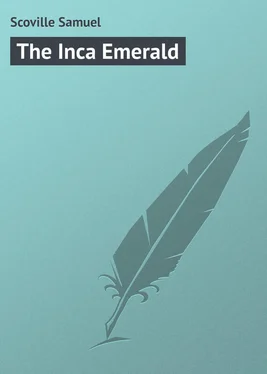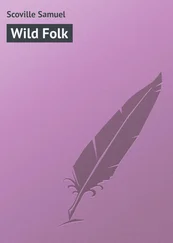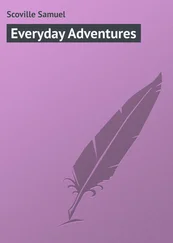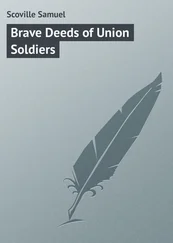Samuel Scoville - The Inca Emerald
Здесь есть возможность читать онлайн «Samuel Scoville - The Inca Emerald» — ознакомительный отрывок электронной книги совершенно бесплатно, а после прочтения отрывка купить полную версию. В некоторых случаях можно слушать аудио, скачать через торрент в формате fb2 и присутствует краткое содержание. Жанр: Прочие приключения, foreign_prose, на английском языке. Описание произведения, (предисловие) а так же отзывы посетителей доступны на портале библиотеки ЛибКат.
- Название:The Inca Emerald
- Автор:
- Жанр:
- Год:неизвестен
- ISBN:нет данных
- Рейтинг книги:4 / 5. Голосов: 1
-
Избранное:Добавить в избранное
- Отзывы:
-
Ваша оценка:
- 80
- 1
- 2
- 3
- 4
- 5
The Inca Emerald: краткое содержание, описание и аннотация
Предлагаем к чтению аннотацию, описание, краткое содержание или предисловие (зависит от того, что написал сам автор книги «The Inca Emerald»). Если вы не нашли необходимую информацию о книге — напишите в комментариях, мы постараемся отыскать её.
The Inca Emerald — читать онлайн ознакомительный отрывок
Ниже представлен текст книги, разбитый по страницам. Система сохранения места последней прочитанной страницы, позволяет с удобством читать онлайн бесплатно книгу «The Inca Emerald», без необходимости каждый раз заново искать на чём Вы остановились. Поставьте закладку, и сможете в любой момент перейти на страницу, на которой закончили чтение.
Интервал:
Закладка:
Beneath their feet the beach was covered with "angel-wings," pure white shells eight inches long, shaped like the wings of angels in old pictures. With them were beautifully tinted tellinas, crimson olivias with their wonderful zigzag, tentlike color patterns, large dosinias round as dollars, and many other varieties, gold, crimson, and purple.
Some distance down the beach the professor kept a large canoe, in which the whole party paddled out into the bay. As they flashed over the smooth surface, the clamor of the night-life dwindled. Suddenly, from the bushes on a little point, sounded a bird-song which held them all spellbound, a stream of joyous melody, full of rapid, ringing notes, yet with a purity of tone which made the song indescribably beautiful. It seemed to include the ethereal quality of the hermit-thrush, the lilt and richness of the thrasher, and the magic of the veery's song, and yet to be more beautiful than any or all of them together. On and on the magic melody flowed and rippled, throbbed and ebbed in the moonlight. Suddenly it stopped. Then from the same thicket burst out a medley of different songs. Some of them were slow and mellow. Others had silvery, bell-like trills. There were flutelike calls, gay hurried twitterings, and leisurely delicious strains – all of them songs of birds which the Cornwall visitors had never even heard. Then Will, the ornithologist of his party, began to hear songs which were familiar to him. There was the musical chuckle of the purple martin, the plaintive call of the upland plover, the curious "kow-kow" of the yellow-billed cuckoo, and the slow, labored music of the scarlet tanager. Suddenly all of them ceased and once again the original song burst out.
"That thicket must be chuck-full of birds," whispered Jud.
Professor Ditson shook his head.
"It's only one bird," he said, "but the greatest singer of all the world – the white banded mocking bird."
Even as he spoke, the songster itself fluttered up into the air, a brown bird with a white throat, and tail and wings broadly banded with the same color. Up and up it soared, and its notes chimed like a golden bell as its incomparable song drifted down through the moonlight to those listening below. Then on glistening wings the spent singer wavered down like some huge moth and disappeared in the dark of the thicket. In the silence that followed, Will drew a deep breath.
"I'd have traveled around the world to hear that song," he half whispered.
Professor Ditson nodded his head understandingly.
"Many and many an ornithologist," he said, "has come to South America to listen to that bird and gone away without hearing what we have heard to-night. Between his own two songs," went on the professor, "I counted the notes of seventeen other birds of both North and South America that he mimicked."
They paddled gently toward the shore, hoping to hear the bird again, but it sang no more that night. As they neared the beach, the moonlit air was heavy with the scent of jessamine, fragrant only after darkness, and the overpowering perfume of night-blooming cereuses, whose satin-white blossoms were three feet in circumference. Suddenly, just before them, the moon-flowers bloomed. Great snowy blossoms five inches across began to open slowly. There was a puff of wind, and hundreds of them burst into bloom at once, glorious white salvers of beauty and fragrance.
"Everything here," said Will, "seems beautiful and peaceful and safe."
Professor Ditson smiled sardonically. "South America is beautiful," he said precisely, "but it is never safe. Death and danger lurk everywhere and in the most unexpected forms. It is only in South America," he went on, "that you can be eaten alive by fish the size of small trout, or be killed by ants or little brown bats."
Jud listened with much scorn. "Professor," he broke out at last, "I don't take much stock in that kind of talk. Your nerves are in a bad way. My advice to you is – "
What Mr. Judson Adams's advice was, will never be known, for at that moment a dreadful thing happened. Into the beauty of the moonlight, from the glassy water of the bay soared a shape of horror, a black, monstrous creature like a gigantic bat. It had two wings which measured a good twenty feet from tip to tip, and was flat, like an enormous skate. Behind it streamed a spiked, flexible tail, while long feelers, like slim horns, projected several feet beyond a vast hooked mouth. Like some vampire shape from the Pit, it skimmed through the air across the bow of the canoe not ten feet from where Jud was sitting. The old trapper was no coward, but this sudden horror was too much even for his seasoned nerves. With a yell, he fell backward off his thwart, and as his legs kicked convulsively in the air, the monster came down with a crash that could have been heard a mile, raising a wave which nearly swamped the canoe. A moment later, the monstrous shape broke water again farther seaward, blotting out for an instant with its black bulk the rising moon.
"What kind of a sea-devil is that, anyhow?" queried Jud, shakily, as he righted himself, with the second crash of the falling body still in his ears.
"That," responded Professor Ditson, precisely, "is a well-nourished specimen of the manta-ray, a fish allied to the skate family – but you started to speak about nerves."
Jud, however, said nothing and kept on saying the same all the way back to the house. Arriving there in safety, he went down to the spring for some water with Pinto, but a moment later came bolting back.
"What's the matter now, Jud?" inquired Will, solicitously. "Did you find another water-devil in the spring?"
"That's just what I did!" bellowed Jud. "When I started to dip out a pail of water, up pops about six feet of snake. Now you know, boys," he went on, panting, "I hate snakes, an' I jumped clear across the spring at the sight of this one; but what do you suppose that Injun did?" he continued excitedly. "Pats the snake's head an' tells me it's tame an' there to keep the spring free from frogs. Now what do you think of that?"
"He was quite right," observed Professor Ditson, soothingly. "It is a perfectly harmless, well-behaved serpent, known as the mussarama. This one is a fine specimen which it will be worth your while to examine more carefully."
"I've examined it just as carefully as I'm goin' to," shouted Jud, stamping into the house as Pinto came grunting up the path carrying a brimming bucket of water.
As they sat down for supper, a long streak of black and white flashed across the ceiling just over Jud, who sat staring at it with a spoonful of soup half-way to his mouth.
"Professor Ditson," he inquired softly, "is that thing on the ceiling another one of your tame snakes?"
"No, sir," responded the professor, impatiently; "that is only a harmless house-lizard."
"I just wanted to know," remarked Jud, rising and taking his plate to a bench outside of the door, where he finished his supper, in spite of all attempts on the part of the boys to bring him back.
In front of Will stood a pitcher of rich yellow cream. "You have a good cow, Professor Ditson," he remarked politely as he poured some into a cup of the delicious coffee which is served with every meal in Brazil.
"Yes," agreed the scientist, "I have a grove of them." Then he explained to the bewildered Will that the cream was the sap of the cow tree.
Will was not so fortunate with his next investigation. Taking a second helping of a good-tasting stew which Pinto had brought in from the kitchen, he asked the Indian what it was made of.
"Tinnala," replied the Mundurucu.
"What is it in North American?" persisted Will.
The Indian shook his head. "I not know any other name," he said. "Wait, I show you," he went on, disappearing into the kitchen to return a moment later with a long, hairy arm ending in a clenched fist. Will started up and clasped his stomach frantically, remembering all that he had read about cannibalism among the South American Indians. Even when Professor Ditson explained that the stew was made from a variety of monkey which was considered a great delicacy, he was not entirely reassured and finished his meal on oranges.
Читать дальшеИнтервал:
Закладка:
Похожие книги на «The Inca Emerald»
Представляем Вашему вниманию похожие книги на «The Inca Emerald» списком для выбора. Мы отобрали схожую по названию и смыслу литературу в надежде предоставить читателям больше вариантов отыскать новые, интересные, ещё непрочитанные произведения.
Обсуждение, отзывы о книге «The Inca Emerald» и просто собственные мнения читателей. Оставьте ваши комментарии, напишите, что Вы думаете о произведении, его смысле или главных героях. Укажите что конкретно понравилось, а что нет, и почему Вы так считаете.












